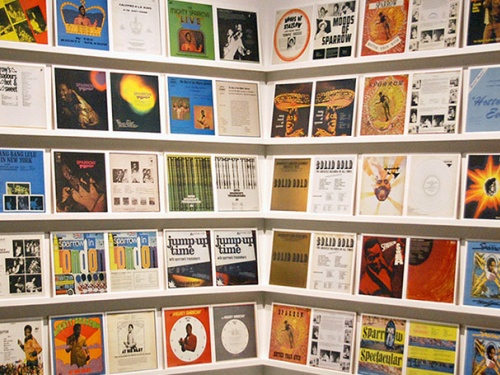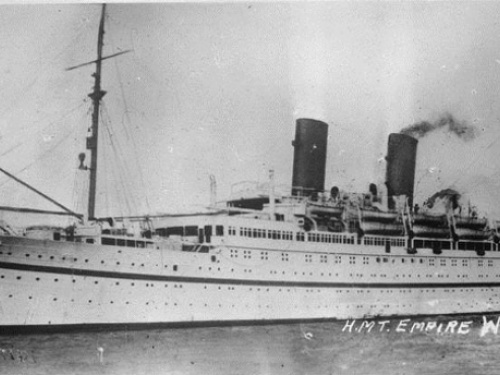Calypso Picaresque
The particular genius of Mighty Sparrow
Artists Mark Harris and Carmel Buckley explore the music and lyrics of calypsonian Mighty Sparrow, the subject of their current ICA Fox Reading Room exhibition Sparrow Come Back Home.
As a result of getting things ready for the ICA show, we’ve been wondering these last six months how to account for Mighty Sparrow’s particular genius. Across 60 years of composing and performing, Sparrow has consistently made remarkable recordings. Besides the compelling melody and rhythm, what he does best is conjure unpredictable and irreverent meaning from the English language, regardless of whether the song primarily intends political commentary or humorous entertainment. More than anything it comes down to Sparrow’s punchy vocal calypso treatments, the colourful Trinidadian slang and his wit and phrasing.
What is it about this phrasing that is so unusual? Sparrow sang many humorously insightful calypsos that addressed topical events of local or international significance, but two early songs make particularly hilarious mischief out of quintessentially Trinidadian picaresque inventions.
Take Benwood Dick, Sparrow’s 1960 tale of a boy’s bewilderment at the sudden appearance of his sister’s shabby ex-boyfriend who expects to awaken her affection with the memory of his peculiar anatomy. Sparrow sings both characters’ parts quite fast, shaping the lyrics with a relaxed, lilting voice that rises and falls effortlessly, managing to make fun of the hapless suitor while expressing his yearning musically:
Tell you sister to come down quick I have something here for she
Tell she it’s Mr. Benwood Dick the man from Sangre Grande
She know me well
Hmm…ah give she already, hmm…
She must remember me
Go on, go on, just tell she Mr. Benwood come
That double ‘hmm’, with its brief pauses, is inflected to suggest Benwood’s pleasurable recall of their earlier erotic encounters. The song is full of cleverly observed salaciousness. Benwood’s "black and greasy shirt" and "dirty dirty alpagat" (a Trinidadian straw sandal) only underline his provinciality—he is from the east coast town of Sangre Grande (pronounced Sandy Grandy)—and the improbableness of his sexual assertiveness.


We can also never get enough of listening to Simpson, perhaps the most extraordinary of the early great songs (and there are many) that tells of a rumour spreading about Sparrow’s death. It takes the entire song for Sparrow to find out that a rival calypso singer is responsible:
The man who spread this rumour is a wicked as the Devil
Guess who. We don’t know who…
… This time it was Melody, the ugliest calypsonian
With the face like a saucepan
In the meantime, he narrates a series of farcical misunderstandings involving avaricious relatives:
They ain’t worried because they hear Sparrow get killed
They want to know which one of them I left in the will, Amen!
Debt collectors:
Is not to hear how much money I owing
So much false receipts they showing
And newly enamoured fans:
A fella tell me something, he may be lying
But he say plenty women was crying
Women that never talk to me yet
But they crying, all their dress wet
Boo-hoo, boo-hoo, Sparrow dead now what we go do?
Give me the dagger from off the shelf
I might as well kill myself. Amen!
The confident phrasing and harmony are so delightful, the narrative so smart and funny, the language so rich, that had Sparrow retired at this point in the late 1950s his genius would still be acclaimed. Yet a few weeks ago, as we ran through his recordings preparing a playlist for the gallery, it seemed that there were over 200 more songs that we couldn’t possibly do without.
In his 1976 song No Smut For Me, calypsonian Chalkdust criticises the kind of sexy content that Sparrow handles so deftly. Yet there’s a lovely moment in Geoffrey Dunn’s film Calypso Dreams, recently shown at the ICA, where Chalkdust movingly allegorizes Sparrow’s achievements. "God has given gifts to calypsonians", Chalkdust says.
He gave some the gift of the gab. He gave some the gift to study and to do research. He gave some the gift to do commentary. He say gave some the gift to give humour. And he gave some the gift to do jump-up calypsos. But of all the gifts that God has given, He has given Sparrow all of them. And He has given Sparrow the most.
Indeed, the man has no equal. ■
Carmel Buckley and Mark Harris: Sparrow Come Back Home is on at the ICA until 5 February.
This article is posted in: Articles, Exhibitions, Music
Tagged with: Mighty Sparrow, Mark Harris, Carmel Buckley, Calypso, Music, Sparrow Come Back Home





